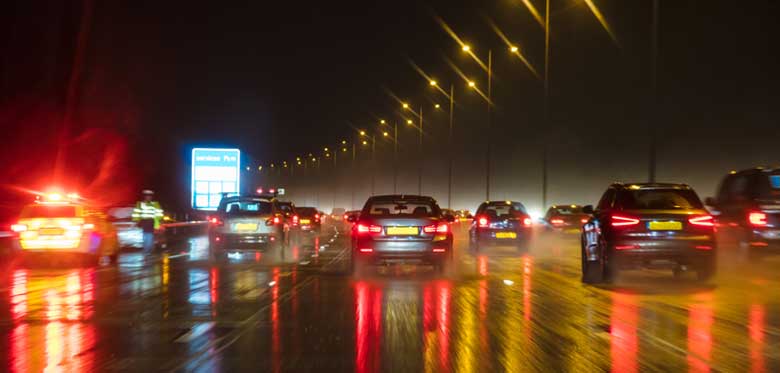At the end of October the clocks go back, sunset occurs earlier in the day and unfortunately, the number of road traffic accidents rise.
In 2019, pedestrian deaths rose from 33 in September and 36 in October to 54 in November and 57 in December. Work by the RAC Foundation confirms that on average, there are 278 more personal injury collisions per year after the clocks go backwards than the fortnights preceding them (an increase of 5.1%). It should however be noted that the worsening weather at this time of year could also be significant factor.
Top tips to stay safe
To help you and others stay safe, we have put together some top tips on driving in the dark:
Drive on roads which have good light whenever possible and use your car lights appropriately. Use your full beam on unlit country roads but be careful not to dazzle oncoming vehicles by switching them back to dipped beam straight away you see them. Using your car lights before sunset and for an hour after sunrise can also help other drivers see you.
Plan your journey well ahead and make sure you are prepared for any bad weather that might occur. Allow more time for your journey so you are not driving under pressure.
Be prepared and have supplies handy. Having supplies in your car in case of a breakdown in bad weather is a good idea such as having a blanket, warm clothing, food and drink which will help you whilst waiting for assistance. It is also useful to have a torch in case you need to inspect your car.
Keep your windows clean and clear of obstructions. Do not drive with partially de-iced and fogged up windows as this can be very dangerous for you and others.
Watch out for vulnerable road users such as children, the elderly, cyclists and animals as they are at an increased risk at this time of year. People wearing dark clothing can be hard to see in the dark so take care to adjust your speed accordingly when driving in residential areas.
Have your eyes tested regularly to make sure you are wearing the correct prescription glasses, if needed. Anti-reflective coating on lenses can also help reduce glare when driving.
Do not drive when tired. You are a danger to yourself and others if you get behind a wheel when you are tired. If you find yourself becoming drowsy whilst driving, stop in an appropriate place and take a break. It is also important to make sure you schedule some rest stops if driving on a long journey or through the night.
It won’t be long before winter is upon us once the dark nights set in. The cold weather can bring hazards on its own so it is important that you prepare now for the months ahead. Make sure your vehicle is in good working order, check all of your lights are working, stock up on essential supplies and consider changing to winter tyres if needed for extra grip.




Comments